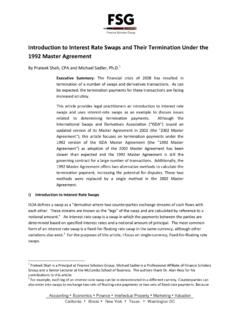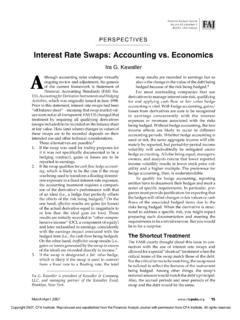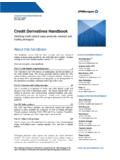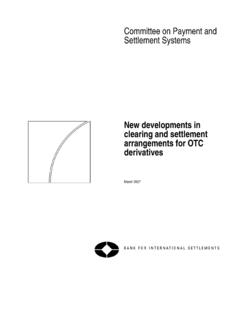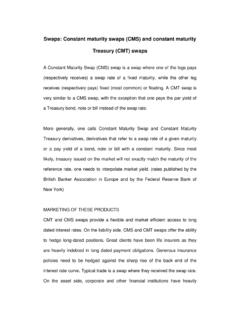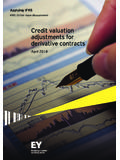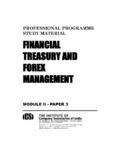Transcription of January 24, 2012 House Committee on Agriculture …
1 January 24, 2012. House Committee on Agriculture 1301 Longworth House Office Building Washington, DC 20515. Re: Support for Bills Scheduled for Mark-Up on January 25, 2012. To the Members of the House Committee on Agriculture : We appreciate the Committee taking up several pieces of bipartisan legislation that would help prevent unnecessary and harmful regulation of derivatives end-users, and we write to offer specific support for five of these bills. We support the Grimm-Peters-Scott-Owens Business Risk Mitigation and Stabilization Act of 2011, 2682, which would ensure that regulators do not impose margin requirements on non- financial end-users. Congressional intent was clear on this point when it passed Dodd-Frank . end-users would not be subject to margin requirements. Nonetheless, regulations proposed by the Prudential Regulators and, to a lesser extent, the CFTC could require end-users to post margin (or leave open the possibility that end-users will be required to post margin in the future).
2 According to a Coalition survey, these margin rules could funnel cash away from productive commercial use as much as $ to $ billion among S&P 500 companies alone costing 100,000 jobs or more. 2682 would clarify that end-users will continue to have the ability to manage risk without the threat of having unnecessary initial and variation margin requirements imposed on them. We are also hopeful that 2682 will be expanded to exempt trades with financial end-users, which employ derivatives similarly, to manage risk. We reiterate our support for the Stivers-Fudge bill, 2779, which would prevent internal, inter-affiliate trades from being subject to regulatory burdens that were designed to be applied only to certain market-facing swaps. Regulators have not provided definitive guidance regarding inter-affiliate trades and have taken the position that such trades are swaps under the Act. We believe that regulation of inter-affiliate trades should square with a simple economic reality: purely internal trades between affiliated parties do not increase systemic risk.
3 Thus, imposing requirements that are designed to address systemic risk on inter-affiliate trades would create costs without any corresponding benefit and would place substantial burdens on end-users and consumers, increasing costs to the economy, and possibly forcing companies to abandon proven and efficient methods of managing their risk through centralized hedging centers. We note that 2779 restricts use of the inter-affiliate exemption only to entities that consolidate their balance sheets. It also includes a specific grant of anti-evasion authority to the CFTC. We support 3527, the Hultgren-Boren bill, which would prevent regulators from creating an overly-inclusive swap dealer definition. The definition currently proposed by regulators may incorrectly classify many legitimate end-users as swap dealers. In particular, the proposed de minimis exception threshold of $100 million gross notional value is too low. CFTC. Commissioner O'Malia has noted that any misclassification of entities would impose requirements that could devour' firms' balance sheets and force them to make difficult decisions between making new investments and hedging their current commercial exposure.
4 House Committee on Agriculture January 24, 2012. Page 2. Energy firms could be hit especially hard. NERA Economic Consulting estimates that a single, typical nonfinancial energy company regulated as a swap dealer could face $388 million in margin, capital, and other swap dealer compliance costs. 3527 would prevent trades entered into for an entity's own account for the purpose of hedging or achieving trading objectives from counting towards whether such entity should be classified as a swap dealer. It also would require regulators to use a de minimis threshold of no less than $3 billion gross notional value. We also support 1840, a bill introduced by Cong. Conaway and Boswell, which would improve cost-benefit analysis by stipulating additional, relevant factors that the CFTC must consider when evaluating the costs and benefits of proposed regulations. During the Dodd-Frank rulemaking process, the CFTC often issued proposed rules that contained minimal cost-benefit analysis, usually less than a page long, even for complex rules, and often without a quantification of potential costs.
5 This bill would require the CFTC to assess both quantitative and qualitative factors and require that it adopt a regulation only after making a reasoned determination that the benefits justify the costs. 2586, the Swap Execution Facility Clarification Act, addresses concerns the Coalition has raised regarding the CFTC's proposed swap execution facility rule, which could disadvantage some end-users by limiting their ability to choose counterparties and modes of execution using their own business judgment. Although certain end-users will be exempt from the Dodd-Frank Act's mandatory clearing and trading requirements, other end-users will still be subject to them. As we explained in our comment letter to the CFTC on March 8, 2011, the CFTC's proposed requirement, that request for quote systems must transmit requests to no less than five market participants, would restrict end-users' access to cost-effective hedging. We support the goals of 2586 that would help address this concern and other problematic aspects of the CFTC's proposed rule to help ensure that end-users will have a variety of options and methods for hedging their risk.
6 We appreciate the Committee 's hard work in helping to address some of the unintended consequences of the Dodd-Frank Act, and stand ready to work with you to pass legislation aimed at achieving more effective and efficient regulation through a balanced, smarter regulatory process. Sincerely, Agricultural Retailers Association American Petroleum Institute Business Roundtable Financial Executives International National Association of Corporate Treasurers National Association of Manufacturers The Real Estate Roundtable Chamber of Commerc
